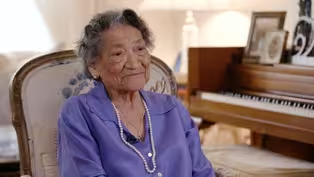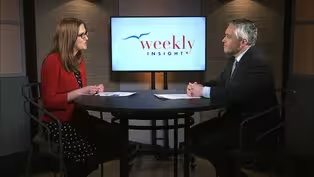
Preserving Our Past
Clip: Season 5 Episode 7 | 8m 37sVideo has Closed Captions
Dive into the state archive. What treasures could go on display at a new cultural center??
Rhode Island was the first of the original colonies to break ties with England but is now the last to build a state archive to house such precious documents as original copies of the Declaration of Independence and the Bill of Rights. What will it take to bring a culture and education center to Providence and what is inside the current vault and up at the State House waiting for permanent display?
Problems playing video? | Closed Captioning Feedback
Problems playing video? | Closed Captioning Feedback
Rhode Island PBS Weekly is a local public television program presented by Ocean State Media

Preserving Our Past
Clip: Season 5 Episode 7 | 8m 37sVideo has Closed Captions
Rhode Island was the first of the original colonies to break ties with England but is now the last to build a state archive to house such precious documents as original copies of the Declaration of Independence and the Bill of Rights. What will it take to bring a culture and education center to Providence and what is inside the current vault and up at the State House waiting for permanent display?
Problems playing video? | Closed Captioning Feedback
How to Watch Rhode Island PBS Weekly
Rhode Island PBS Weekly is available to stream on pbs.org and the free PBS App, available on iPhone, Apple TV, Android TV, Android smartphones, Amazon Fire TV, Amazon Fire Tablet, Roku, Samsung Smart TV, and Vizio.
Providing Support for PBS.org
Learn Moreabout PBS online sponsorship- [Ashley] It's one of those remarkable things that people underestimate until they see it, and then they always have a response.
- [Pamela] State archivist, Ashley Selima, says it's often an emotional response to seeing close up one of the original copies of the Bill of Rights guaranteeing freedom.
- They can't believe that it exists, let alone that the littlest state in the union has it.
- [Pamela] The littlest state in the union holds history that's a big part of the national story.
There's row after row of scroll documents, maps and boxes of records dating back to 1638.
They are testament to our role in the founding of America and beyond, such as a moon rock and our state flag flown on the moon by the Apollo 17 mission.
- There's so much about this job that intrigues me, but more than anything, this job is fantastic because I learn every day.
I learn new things about Rhode Island history.
- What is it like for you to actually see and touch some of these rare items?
- It never gets old, but it causes me to move very slowly.
You always wanna be really careful.
- [Pamela] These fragile rare relics of history are kept in a climate controlled vault in a rented office that looks more like a storage room.
It's the repository of well over 10 million items, some unusual, like this World War I fundraising poster promoted by seven women's organizations.
- One of the more, I guess, interesting and fun facts about this poster and this collection of posters is there's several of these that are also on display at Arlington National Cemetery.
So we know we at least have one record in common with some of the federal record keepers as well.
- [Pamela] Other unexpected items, vintage voting machines and patents for local inventions like a coffee urn and this washboard, they all reside in the same place as a seminal moment of statehood, small as your thumbnail, our emblem is first mentioned in this pre-revolutionary report.
- It is ordered that the seal of the province shall be an anchor and then they doodled it over on the side.
- [Pamela] So that's the first moment that we found out what our symbol of hope would look like?
- Yep, that was the first iteration.
I think one thing people don't understand is a government record is far more complex, it's not just like a memo in a box.
It can include correspondence, it can include maps, so helping Rhode Islanders see the story connected from all those different things, that's part of my day to day.
- [Pamela] Selima also uncovers little known facts about Rhode Island in her archival research.
Recently, the dark day that shook the State was a record Selima discovered while coordinating an exhibit on wild weather.
- It was in the early 1700s, and it was an event where the sun rose and then all of a sudden before noon, the day became completely dark.
And many people at that time, they were very religious and they thought it might be the end of days.
And scientists and historians believe now that it was probably actually the effect of wildfires in Canada like we saw last year.
- [Pamela] Years of census data, genealogy and military records are available here, and you can read this letter from Rhode Island colonists informing the King, they were breaking ties with England.
- That's why everybody really loves this document, and it really talks about Rhode Island being a forerunner in so many things.
- [Pamela] So while Rhode Island was first to renounce the Crown, State leaders say we are the last in New England to construct a building to house our historic documents.
That's something the governor wants to change.
In his State of the State address, he proposed an archive and cultural center.
- A place to display our founding documents and important treasures.
- [Pamela] Secretary of State, Greg Amore, applauds the idea.
His office oversees the archival materials.
- One of the cool things that the tours all like is the story of the chandelier, because the chandelier is the first public building in America that has electricity.
- [Pamela] Amore is also a history buff and former high school civics teacher.
He says The new center will be important for education as well as preservation.
Amore points out items at the State House such as this full length painting of George Washington by famed Rhode Island portrait artist, Gilbert Stuart, need a better showcase.
- Today, this is worth in excess of $10 million and we're concerned about this.
This is not a temperature controlled room.
The light changes from time to time, and so we would like to preserve this in a space that is correct.
- [Pamela] Amore says a new archive could prove to be an economic boost as a tourist destination, and more importantly, as a legacy for future generations.
- We have a responsibility to preserve these treasures.
Some of them are incredibly unique.
We have 64 letters from George Washington to the General Assembly and to the governor.
Incredible.
We have a telegram from Abraham Lincoln asking for troops to support the union in the Civil War.
- [Pamela] Amore adds, since Rhode Island was one of the original 13 colonies, we have a treasure beyond measure.
This copy of the Declaration of Independence with John Hancock's bold signature.
- I'm getting tingles now talking about it and I'm not embarrassed by that.
I think we should all feel that way about our history and feel that way about the unique aspects of Rhode Island history.
- And Amore thinks people do, judging by the numbers that turned out recently to see the Independent Man when he came off the State House dome for refurbishing.
Initial plans would be to build a cultural center possibly across the street from the State House at an estimated cost of a little over $100 million.
Some people are saying a $100 million is a lot of money given all of the needs of the state in various areas.
So how do you justify this?
- There are competing interests and there are legitimate competing interests, and I understand that.
What I want people to understand is we're either going to abandon our commitment to preserve these documents and celebrate and tell the story of Rhode Island, the entire story, or we're not.
And we're already paying for that.
- [Pamela] The state pays $300,000 a year for the current storage space.
A lot will have to happen to move all this to a permanent home.
Legislators have to agree to put a $60 million bond issue on the November ballot and voters would have to approve it.
Yet, in spite of all the obstacles, Amore believes that preserving our history is not just for the past but for the future.
And he's inspired by a young Illinois lawyer from the 1800s.
- Abraham Lincoln gave a really unknown speech when he was a young Illinois state legislator, it's called the Lyceum Speech.
And he talks about political violence and mobocracy overtaking our political institutions, really prescient.
He was talking about the fear that in the future we would be the cause of our own demise.
It would be internal decay that caused our demise.
And he said, the only antidote is civic education.
The only antidote is to immerse yourselves in the Declaration of Independence, the Constitution, the Bill of Rights, talk about what those values are and what they mean.
Video has Closed Captions
Clip: S5 Ep7 | 9m 17s | World War II nurse, Bennie Fleming, reflects on living a life of service (9m 17s)
Video has Closed Captions
Clip: S5 Ep7 | 5m 43s | Ted Nesi and Michelle San Miguel discuss lawmakers’ inquiries into the Washington Bridge. (5m 43s)
Providing Support for PBS.org
Learn Moreabout PBS online sponsorship
- News and Public Affairs

Top journalists deliver compelling original analysis of the hour's headlines.

- News and Public Affairs

FRONTLINE is investigative journalism that questions, explains and changes our world.












Support for PBS provided by:
Rhode Island PBS Weekly is a local public television program presented by Ocean State Media

